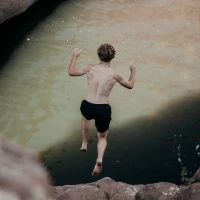Freediving is much more than just a recreational activity; it is a journey that allows individuals to explore the depths within themselves. This unique underwater sport combines the beauty of the ocean with the practice of deep breathing and meditation, leading to a profound sense of mindfulness and a positive mindset. In this article, we will delve into the world of freediving and discover how it can help unlock our inner potential for personal growth and well-being.
The Fascination with Diving
The allure of the underwater world
From early childhood, humans have been fascinated by the mysteries of the deep sea. The mesmerizing beauty of coral reefs, colorful marine life, and unexplored terrains have driven many to venture into the world of diving. Whether it is scuba diving or freediving, the experience of being submerged in water is captivating and awe-inspiring.
A sport for connecting with nature
Diving offers a unique opportunity to connect with nature in a profound way. It allows individuals to witness the wonders of the underwater ecosystem firsthand and immerse themselves in the tranquility of the ocean. The act of diving itself requires mastering the art of breath control, which cultivates mindfulness and a deep sense of presence.
The physical and mental benefits of diving
Beyond its spiritual and emotional aspects, diving also offers numerous physical and mental health benefits. It is an excellent form of exercise that engages various muscle groups and improves cardiovascular fitness. Diving also promotes mental well-being by reducing stress and anxiety levels, enhancing focus and concentration, and boosting self-confidence.
Introducing Freediving: A Dive into Mindfulness
What is freediving?
Freediving is a form of diving that involves descending into the depths of the ocean without the aid of scuba equipment. Unlike scuba diving, which relies on artificial breathing apparatus, freediving relies solely on the diver’s ability to hold their breath. It is both a sport and a way of experiencing the underwater world in its purest form.
The philosophy behind freediving
Freediving is not just about exploring the depths of the ocean but also about exploring the depths within ourselves. It is grounded in the philosophy of self-discovery, mindfulness, and personal growth. By learning to navigate the underwater world with grace and ease, freedivers develop a deep connection with their inner selves and the environment around them.
The role of mindfulness in freediving
Mindfulness plays a significant role in freediving as it requires complete focus and awareness of the present moment. To descend into the depths and resurface safely, freedivers must stay fully attuned to their body’s signals and regulate their breath consciously. This heightened state of mindfulness cultivates a sense of calm, clarity, and inner peace.
The breath-hold: A gateway to mindfulness
The core element of freediving is the ability to hold one’s breath for extended periods. This practice of breath-holding is not only essential for diving but also serves as a powerful tool for cultivating mindfulness. By deepening their breath control and practicing breath-hold exercises, freedivers learn to find a harmonious balance between their mind and body.
The Connection between Freediving and Positive Mindset
Overcoming fear and embracing challenges
Freediving inherently involves stepping out of one’s comfort zone and facing fears. The vastness of the underwater world and the unknown depths may evoke feelings of uncertainty, but freediving teaches individuals to confront their fears head-on. By doing so, they develop resilience, courage, and a positive mindset that can be applied to various aspects of life.
Letting go and surrendering to the moment
In the depths of the ocean, freedivers learn to let go of control and surrender to the present moment. As they descend further into the water, they leave behind the distractions and worries of the surface world. This act of surrendering allows freedivers to tap into a state of deep relaxation and inner stillness, creating space for personal growth and self-reflection.
Cultivating mindfulness through visualization
Visualization is a powerful technique often employed by freedivers. Before a dive, they mentally rehearse their movements, imagine the underwater environment, and envision a successful and safe descent. This practice not only enhances physical performance but also cultivates a positive and focused mindset. Visualization techniques can be applied to various aspects of life to achieve goals and overcome obstacles.
Flow state: Merging with the underwater world
Freediving offers a unique opportunity to experience the state of flow, where time seems to stand still, and actions flow effortlessly. In this state, freedivers become one with the underwater world, effortlessly gliding through the water and feeling in harmony with their surroundings. The flow state fosters a positive mindset, as individuals lose themselves in the present moment, free from distractions and negative thoughts.
The Science Behind Freediving and Mindfulness
The physiological effects of breath-hold diving
Freediving involves prolonged periods of breath-holding, which elicits specific physiological responses in the body. As the diver holds their breath, the heart rate decreases, blood vessels constrict, and oxygen is conserved. These adaptive changes allow freedivers to explore deeper depths and stay submerged for longer durations. The breath-hold diving experience induces a state of relaxation and tranquility, which promotes mindfulness and positive well-being.
The impact of diving on mental health
Numerous studies have highlighted the positive effects of diving on mental health. The immersion in water and the focus required during diving help individuals disconnect from everyday stressors and experience a sense of calm. The deep breathing exercises practiced in freediving promote relaxation by reducing stress hormones and increasing the production of endorphins, the body’s natural mood enhancers.
Unlocking Mindfulness and Positive Mindset: Training for Freediving
Physical preparation for freediving
To excel in freediving and unlock mindfulness and a positive mindset, physical preparation is crucial. Regular physical exercise, including cardio workouts, strength training, and flexibility exercises, helps improve lung capacity, endurance, and overall fitness. Additionally, specific breathing exercises and apnea training can enhance breath control and tolerance to carbon dioxide.
Mental training techniques for freediving
Freediving is as much a mental sport as it is a physical one. Mental training techniques play a vital role in preparing for the challenges of freediving and cultivating mindfulness. Visualization, meditation, and mindfulness practices can help build focus, concentration, and mental resilience. Mental training also involves the development of a positive self-talk and the ability to manage anxiety and fear.
Safety considerations and freediving
While freediving is a rewarding and transformative experience, it is essential to prioritize safety at all times. Proper training from qualified instructors, understanding dive limits, and using appropriate freediving equipment are crucial to ensure a safe and enjoyable experience. Regular medical check-ups and staying hydrated are also essential for maintaining optimal physical and mental well-being during freediving.
Conclusion
Freediving offers a transformative journey into the depths of both the ocean and the self. Through breath-hold diving, mindfulness, and a positive mindset, individuals can unlock their inner potential, connect with nature, and find profound personal growth. By embracing the challenges and opportunities that freediving presents, one can explore the depths within and cultivate mindfulness that extends beyond the underwater world. So take a deep breath, dive in, and let the ocean guide you towards a more mindful and positive way of living.










